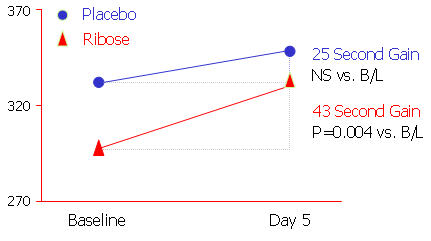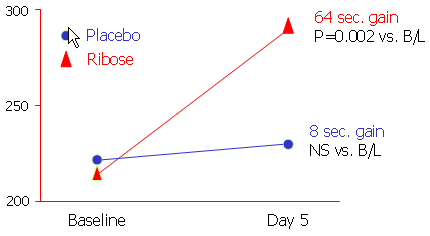
Return to Bioenergetic Support Page
Ribose in Coronary Insufficiency
Ribose allows the rapid regeneration of ATP in a low oxygen environment. Effort limitation and ST depression are the symptomatic and EKG signs of myocardial ATP deficiency, so let's see what effect ribose supplementation has on these parameters of cardiac health:
This study looked at twenty men with angiographically documented coronary disease and reproducibly abnormal stress EKG studies. Separate maximal stress EKG studies were carried out on day one and on day two (by creating ischemia two days in a row, depletion of adenine nucleotides, ATP, ADP, and AMP, will occur). They were then randomized to receive over three days either placebo or ribose at a dose of 15 gm. four times a day. On day five, following three days of ribose supplementation, a third stress EKG was carried out. A double blind protocol was followed, such that neither the patients nor the researchers were aware of which subjects were receiving ribose and which subjects were receiving placebo:
Time to Moderate Angina

With placebo therapy, there was a statistically non-significant 25 sec. increase in treadmill time to moderate angina. With ribose there was a significant, 43 sec. increase. In other words, with ribose supplementation the patients could walk farther before chest pain became an issue.
Time to ST Segment Depression
 Treadmill time to ST depression, an objective marker of myocardial ATP
deficiency, did not change significantly with placebo therapy, but increased by
over one minute in the ribose group. By rapidly assisting in the
regeneration of AMP from adenosine, ribose increased the ability of the cardiac
cells to regenerate ATP from the energy it derives from the burning of sugar and
fat. Ribose recouped oxidative phosphorylation with useful AMP and ADP
rephosphorylation in to ATP.
Treadmill time to ST depression, an objective marker of myocardial ATP
deficiency, did not change significantly with placebo therapy, but increased by
over one minute in the ribose group. By rapidly assisting in the
regeneration of AMP from adenosine, ribose increased the ability of the cardiac
cells to regenerate ATP from the energy it derives from the burning of sugar and
fat. Ribose recouped oxidative phosphorylation with useful AMP and ADP
rephosphorylation in to ATP.
While all this biochemistry is of interest to me, the bottom line to you as a patient with coronary disease is that ribose supplementation will allow you to do more, with less angina and/or shortness of breath, for any degree of coronary artery narrowing that you possess - without any side-effects!
James C. Roberts MD FACC
1/01/07